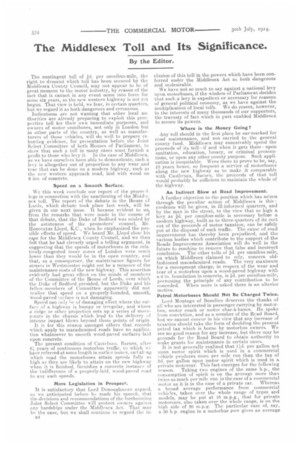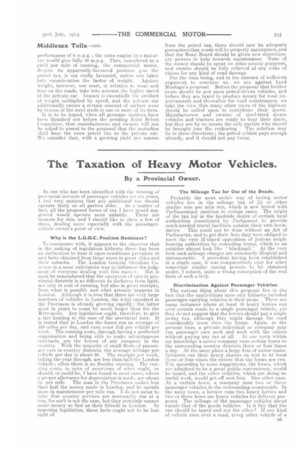The Middlesex Toll and Its Significance.
Page 2

Page 3

If you've noticed an error in this article please click here to report it so we can fix it.
By the Editor.
The contingent toll of gd. per omnibus-mile, the right to demand which toll has been secured by the Middlesex County Council, may not appear to be of great moment to the motor industry, by reason of the fact that it cannot in any event came into force for some six years, as the new western highway is not yet begun. That view is held, we fear, in certain quarters, hut we regard it as both dangerous and erroneous. Indications are not wanting that other local authorities are already preparing to exploit this prospective toll for their own immediate purposes, and owners of motor omnibuses, not only in London but in other parts of the country, as well as manufacturers of those vehicles, will do well to prepare rebutting evidence, for presentation before the Joint Select Committee of both Houses of Parliament, to show that such a toll in many eases must furnish a profit.to those who levy it. In the case of Middlesex, as we have ourselves been able to demonstrate, such a levy is altogether out of proportion to any wear and tear that can he done on a modern highway, such as the new western approach road, laid with wood on 6 ins, of concrete.
Speed on a Smooth Surface.
We this week conclude our report of the proem d • irgs in connection with the sanctioning of the Midd'esex toll. The report of the debate in the House d Lords, which debate took place last week, will be given in our next issue. It became evident to us, from the remarks that were made in the course of that debate, that the Duke of Bedford was misled by the astuteness of the promoters' counsel, Mr. Honoratus Lloyd, K.C., when he emphasized the possible effects of speed. We heard Mr. Lloyd close his case for the Middlesex County Council, and we then felt that he had cleverly urged a telling argument, in suggesting that the speeds of motorbuses in the relatively-congested inner zones of London were lintel' lower than they woukl be in the open country, and that, as a consequence, the maintenance figures for streets in Westminster might not be a measure of the maintenance costs of the new highway. This assertion evidently had great effect on the minds of members of the Committee of the House of Lords, over which the Duke of Bedford presided, but the Duke and his fellowonembers of Committee apparently did not realize that speed on a properly-founded, smooth, wood-paved surface is not damaging. Speed can only he of damaging effect where the surface of a highway is bumpy or irregular, and where a ridge or other projection sets up a series of movements in the chassis which lead to the delivery of intense impact blows beyond those points of origin. It is for this reason amongst others that records which .apply to macadamized roads have no application whatsoever to smooth wood-paved surfaces laid upon concrete.
The present. condition of Castelnau. Barnes, after 6. years of continuous motorbus traffic, to which we have referred at some length in earlier issues, a ad alrng which road the motorbuses attain speeds fully as high as they are likely to attain on the new highway when it is finished, furnishes a concrete instance of the indifference of a. properly-laid, wood-paved road to any such speeds.
More Legislation in Prospect.
It is satisfactory that Lord Donoughmore argued, as we anticipated before he made his speech, that the decisions and recommendations of the forthcoming joint. Select. Committee will protect. owners against any hardships under the Middlesex Act. That may be the case, but we shall continue to regard the in let elusion of this toll in the powers which have been conferred under the Middlesex Act as both dangerous and undesirable.
We lia,ve not so much to say against a national levy upon motorbuses, if the wisdom of Parliament decides that such a levy is expedient or necessary for reasons of general political economy, as we have against the multiplication of local tolls. We do resent, however, in the interests of many thousands of our supporters, the travesty of fact which in part enabled Middlesex to secure its powers.
Where is the Money Going ?
Any toll should in the first place be ear-marked for noad maintenance, and not carried to the general county fund. Middlesex may conceivably spend the proceeds of its toll—if and when it gets them—upon sanitation, education, lunacy, or criminal prosecutions, or upon any other county purpose. Such application is inequitable. Were there to prove to be, say, 10 years hence, so frequent a service of motorbuses along the new highway as to make it comparable with Castlenau, Barnes, the proceeds of that toll would probably be sufficient to maintain the whole of the highway.
An Indirect Blow at Road Improvement.
A further objection to the position which has arisen. through the peculiar action of Middlesex is this : credence will be given, in ill-informed quarters, and by the man in the street, to the view that so high a levy as id. per omnibus-mile. is necessary befoac modern highway, built as to three-quarters of its cost out of the proceeds of motor taxation, can be safely put at. the disposal of such traffic. The cause of road improvement has thereby been prejudiced, and the various bodies which contribute to the support of the Roads Improvement Association will do well in the future to combine to remove that false and incorrect conclusion. The other tolls of gd. per omnibus-mile, on which Middlesex claimed to rely, concern oldfashioned macadamized roads. The very maximum for a recoupment charge, in respect of the wear and tear of a motorbus upon a wood-paved highway with a 6 in. foundation in concrete, is id. per omnibus-mile, presuming the principle of any contribution to be conceded. When more is asked there is an ulterior motive.
Petrol Motorbuses Should Not Be Charged Twice.
Lord Montagu of Beaulieu deserves the thanks of all who are interested in passenger carrying by motorbus, motor coach or motor char-it-banes. He spoke from conviction, and as a member of the Read Board, but we cannot concur in his view that any increase of taxation should take the form of doubling the present petrol tax which is borne by motorbus owners. We see no good reason for any increase, but there may be grounds for the Road Board to obtain authority to make grants for maintenance in certain eases.
It is not generally realized that 11d. per gallon net upon motor spirit which is used in a commercial vehicle produces more per mile run than the tax of ad. per gallon upon motor spirit which is used in a private motorcar. This fact emerges for the following reason. Taking two engines of the same h.p., the consumption of spirit is on the average more than twice as much per mile run in the case of a commercial motor as it is in the case of a. private car. Whereas a broad average performance from commercial vehicles, taken over the whole range of types and models, may be put at 10 m.p.g., that for private motorcars, also taken over the whole range, is on the high side of 20 m.p.g. The particular case of, say, a 30 h.p. engine in a motorbus now gives an average performance a 8 m.p.g. ; the same engine in a motorcar would give fully 16 m.p.g. Thus, considered as a yield per mile of running, the commercial motor, despite its apparently-favoured position qua the petrol tax, is not really favoured, unless one takes
into consideration the factor of weight. Against weight, however, one must, in relation to wear and tear on the roads, take into account. the higher speed of the private car. Impact is essentially the product of weight multiplied by speed, and the private ear additionally causes a. certain amount of surface wear by reason of the steel studs in one or more of its tires.
It is to be hoped, when all germane matters have been thrashed out before the pending Joint Select Committee, that manufacturers and owners will not be asked to assent to the proposal that the motorbus shall bear the same .petrol tax as the private car. We consider that, with a growing yield per annum
from the petrol tax, there should now be adequate guarantees that roads will be properly maintained, and that the Road Board should be given new discretionary powers to help towards maintenance. None of the money should be spent on other county purposes, and owners should be fully relieved of any risks of claims for any kind of mad damage. For the time being, and in the absence of sufficient argument to convince us, . we are against Lord Montagu's proposal. Before the proposal that further taxes should be put upon petrol-driven vehicles, and before they are taxed to produce money for road improvements and thereafter for road maintenance, we take the view that many other users of the highway should be called upon to contribute their quota. Manufacturers and owners of steel-tired steam vehicles and tractors are ready to bear their share, but they are by no means the only parties who should be brought into the reckoning. The solution may lie in these directions ; the petrol vehicle pays enough already, and it should not pay twice.
























